2023届中考英语语法专项复习之:一般现在时一般过去式现在进行现在完成时课件(共16张PPT)
文档属性
| 名称 | 2023届中考英语语法专项复习之:一般现在时一般过去式现在进行现在完成时课件(共16张PPT) | 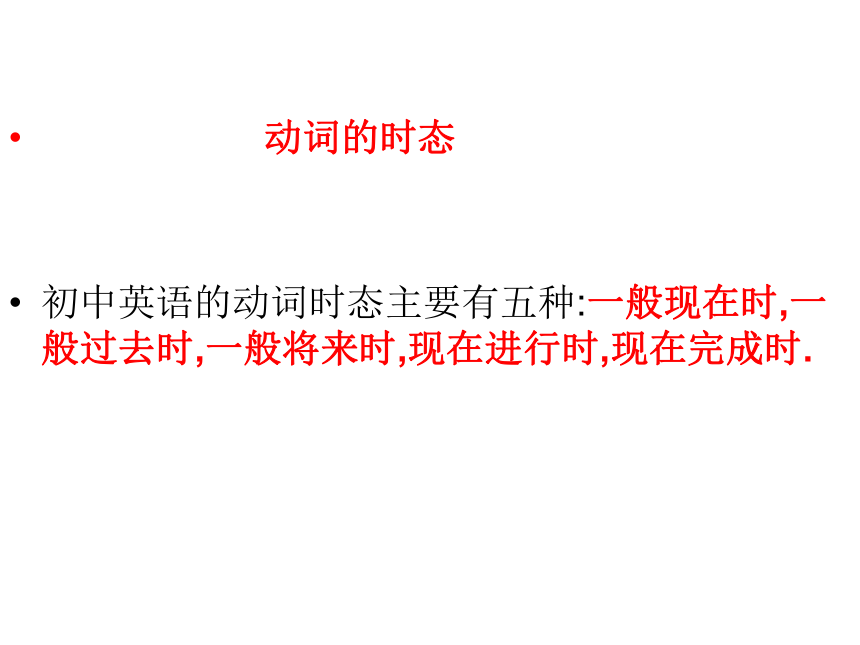 | |
| 格式 | ppt | ||
| 文件大小 | 168.0KB | ||
| 资源类型 | 教案 | ||
| 版本资源 | 通用版 | ||
| 科目 | 英语 | ||
| 更新时间 | 2022-09-12 20:26:42 | ||
图片预览

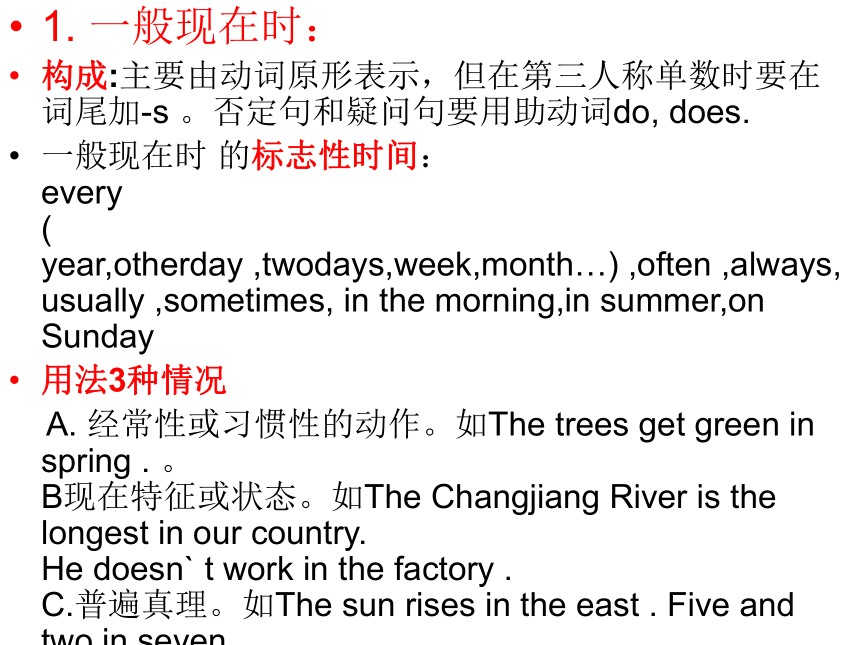
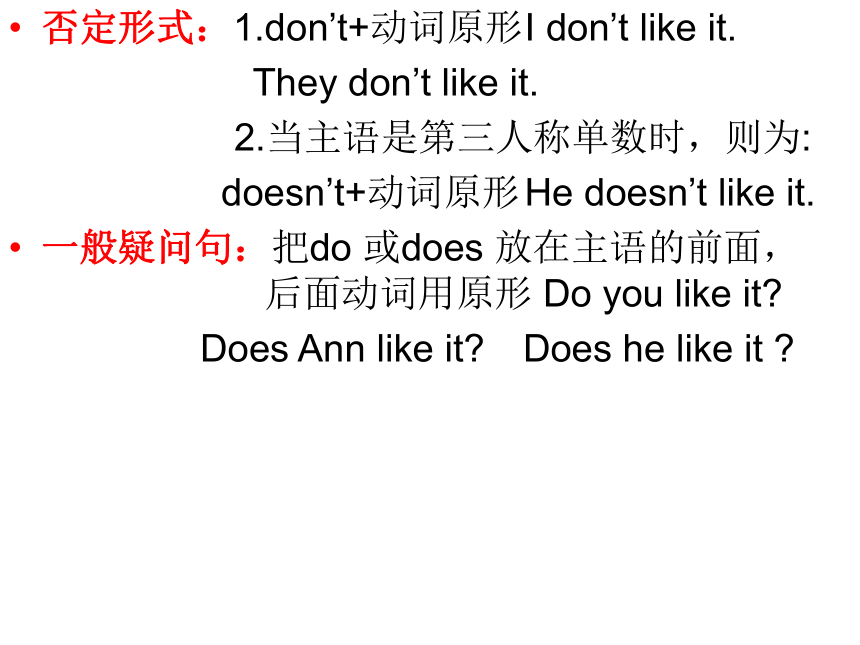
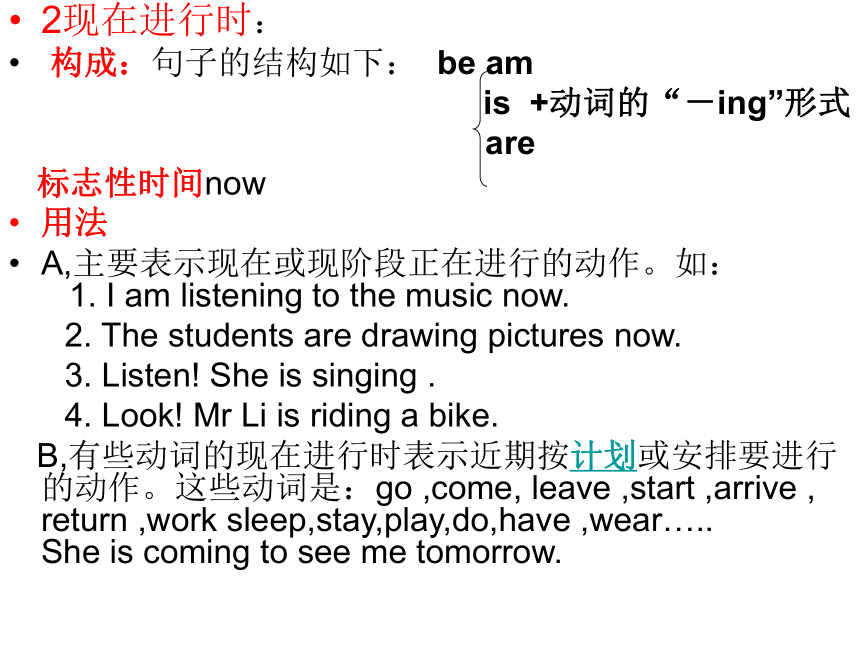
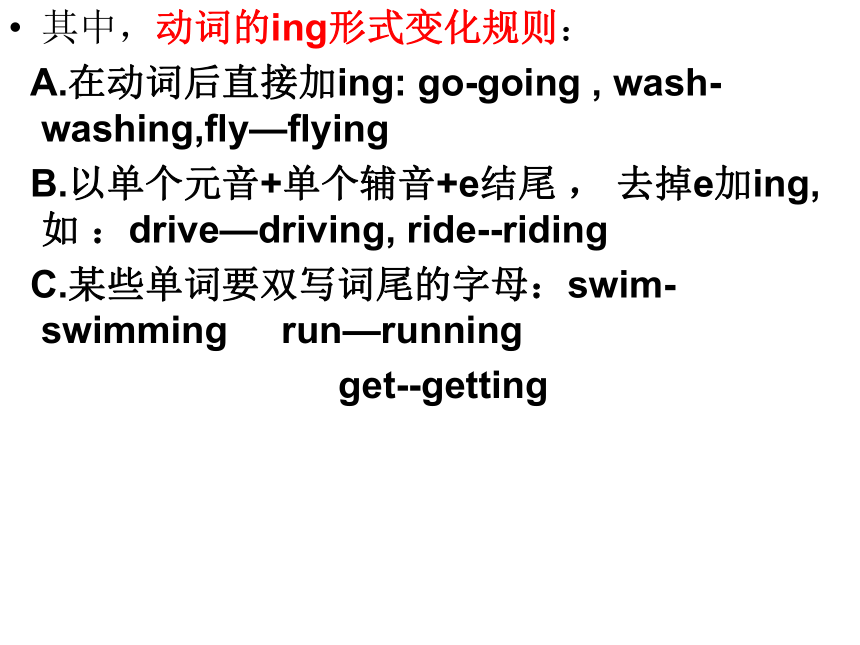
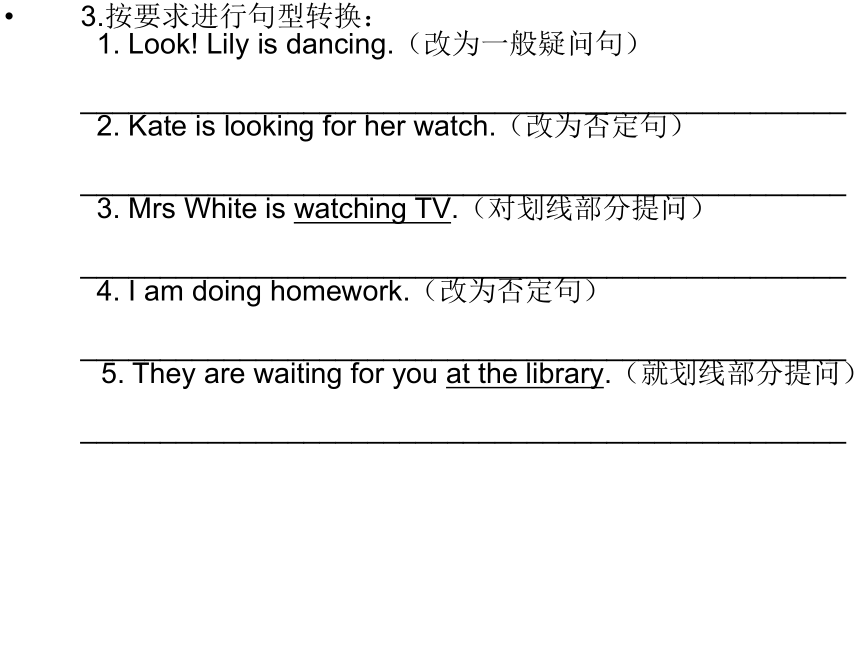
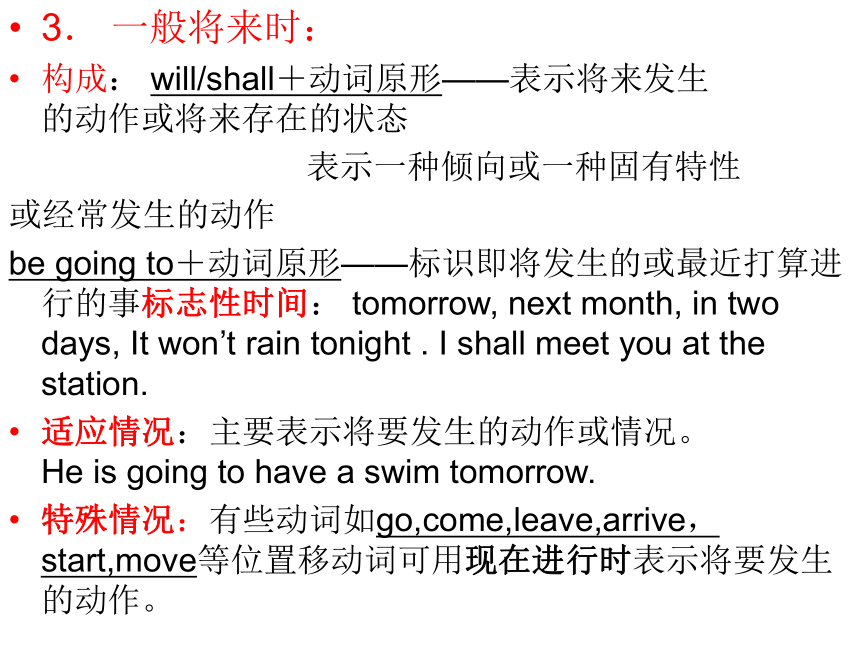
文档简介
(共16张PPT)
动词的时态
初中英语的动词时态主要有五种:一般现在时,一般过去时,一般将来时,现在进行时,现在完成时.
1. 一般现在时:
构成:主要由动词原形表示,但在第三人称单数时要在词尾加-s 。否定句和疑问句要用助动词do, does.
一般现在时 的标志性时间:every( year,otherday ,twodays,week,month…) ,often ,always,usually ,sometimes, in the morning,in summer,on Sunday
用法3种情况
A. 经常性或习惯性的动作。如The trees get green in spring . 。 B现在特征或状态。如The Changjiang River is the longest in our country. He doesn` t work in the factory . C.普遍真理。如The sun rises in the east . Five and two in seven .
否定形式:1.don’t+动词原形 I don’t like it.
They don’t like it.
2.当主语是第三人称单数时,则为:
doesn’t+动词原形 He doesn’t like it.
一般疑问句:把do 或does 放在主语的前面, 后面动词用原形 Do you like it
Does Ann like it Does he like it
2现在进行时:
构成:句子的结构如下: be am
is +动词的“-ing”形式
are
标志性时间now
用法
A,主要表示现在或现阶段正在进行的动作。如: 1. I am listening to the music now.
2. The students are drawing pictures now.
3. Listen! She is singing .
4. Look! Mr Li is riding a bike.
B,有些动词的现在进行时表示近期按计划或安排要进行的动作。这些动词是:go ,come, leave ,start ,arrive , return ,work sleep,stay,play,do,have ,wear….. She is coming to see me tomorrow.
其中,动词的ing形式变化规则:
A.在动词后直接加ing: go-going , wash-washing,fly—flying
B.以单个元音+单个辅音+e结尾 , 去掉e加ing,如 :drive—driving, ride--riding
C.某些单词要双写词尾的字母:swim- swimming run—running
get--getting
3.按要求进行句型转换: 1. Look! Lily is dancing.(改为一般疑问句) ________________________________________________ 2. Kate is looking for her watch.(改为否定句) ________________________________________________ 3. Mrs White is watching TV.(对划线部分提问) ________________________________________________ 4. I am doing homework.(改为否定句) ________________________________________________ 5. They are waiting for you at the library.(就划线部分提问) ________________________________________________
3. 一般将来时:
构成: will/shall+动词原形——表示将来发生 的动作或将来存在的状态
表示一种倾向或一种固有特性
或经常发生的动作
be going to+动词原形——标识即将发生的或最近打算进行的事标志性时间: tomorrow, next month, in two days, It won’t rain tonight . I shall meet you at the station.
适应情况:主要表示将要发生的动作或情况。 He is going to have a swim tomorrow.
特殊情况:有些动词如go,come,leave,arrive,start,move等位置移动词可用现在进行时表示将要发生的动作。
一般将来时练习:
( ) 1. There __________ a meeting tomorrow afternoon.
A. will be going to B. will going to be C. is going to be D. will go to be
( ) 2. Charlie ________ here next month.
A. isn’t working B. doesn’t working
C. isn’t going to working D. won’t work
( ) 3. He ________ very busy this week, he ________ free next week.
A. will be; is B. is; is
C. will be; will be D. is; will be
( ) 4. There ________ a dolphin show in the zoo tomorrow evening.
A. was B. is going to have
C. will have D. is going to be
( ) 5. –________ you ________ free tomorrow
– No. I ________ free the day after tomorrow.
A. Are; going to; will B. Are; going to be; will
C. Are; going to; will be D. Are; going to be; will be
( ) 6. Mother ________ me a nice present on my next birthday.
A. will gives B. will give
C. gives D. give
( ) 7. – Shall I buy a cup of tea for you
–________. (不,不要。)
A. No, you won’t. B. No, you aren’t.
C. No, please don’t. D. No, please.
( ) 8. – Where is the morning paper
– I ________ if for you at once.
A. get B. am getting
C. to get D. will get
( ) 9. ________ a concert next Saturday
A. There will be B. Will there be
C. There can be D. There are
( ) 9. ________ a concert next Saturday
A. There will be B. Will there be
C. There can be D. There are
( ) 10. If they come, we ________ a meeting.
A. have B. will have
C. had D. would have
( ) 11. He ________ her a beautiful hat on her next birthday.
A. gives B. gave C. will giving D. is going to giving
( ) 12. He ________ to us as soon as he gets there.
A. writes B. has written
C. will write D. wrote
( ) 13. He ________ in three days.
A. coming back B. came back
C. will come back D. is going to coming back
( ) 14. If it ________ tomorrow, we’ll go roller-skating.
A. isn’t rain B. won’t rain
C. doesn’t rain D. doesn’t fine
( ) 15. – Will his parents go to see the Terra Cotta Warriors tomorrow
– No, ________ (不去).
A. they willn’t. B. they won’t.
C. they aren’t. D. they don’t.
( ) 16. Who ________ we ________ swimming with tomorrow afternoon
A. will; go B. do; go
C. will; going D. shall; go
( ) 17. We ________ the work this way next time.
A. do B. will do
C. going to do D. will doing
( ) 18. Tomorrow he ________ a kite in the open air first, and then ________ boating in the park.
A. will fly; will go B. will fly; goes
C. is going to fly; will goes D. flies; will go
( ) 19. The day after tomorrow they ________ a volleyball match.
A. will watching B. watches
C. is watching D. is going to watch
( ) 20. There ________ a birthday party this Sunday.
A. shall be B. will be
C. shall going to be D. will going to be
( ) 21. They ________ an English evening next Sunday.
A. are having B. are going to have
C. will having D. is going to have
( ) 22. ________ you ________ free next Sunday
A. Will; are B. Will; be
C. Do; be D. Are; be
( ) 23. He ________ there at ten tomorrow morning.
A. will B. is
C. will be D. be
( ) 24. ________ your brother ________ a magazine from the library
A. Are; going to borrow B. Is; going to borrow
C. Will; borrows D. Are; going to borrows
( ) 25. – Shall I come again tomorrow afternoon
–________ (好的).
A. Yes, please B. Yes, you will. C. No, please. D. No, you won’t.
( ) 26. It ________ the year of the horse next year.
A. is going to be B. is going to
C. will be D. will is
( ) 27. ________ open the window
A. Will you please B. Please will you
C. You please D. Do you
( ) 28. – Let’s go out to play football, shall we
– OK. I ________.
A. will coming B. be going to come
C. come D. am coming
( ) 29. It ________ us a long time to learn English well.
A. takes B. will take
C. spends D. will spend
( ) 30. The train ________ at 11.
A. going to arrive B. will be arrive
C. is going to D. is arriving
答案1. C 2. D 3. D 4.D 5. D 6. B 7. C 8. D
9. B 10. B 11. D 12. C 13. C 14. C 15. B 16. D
17. B 18. A 19. D 20. B 21. B 22. B 23. C 24. B
25. A 26. A 27. A 28. D 29. B 30. D
5.现在完成时:
构成:助动词have/has+过去分词(done)
句型:
否定句:主语+have/has+not+过去分词+其他.
一般疑问句:Have/Has+主语+过去分词+其他.
简略答语: Yes, 主语 + have/has.(肯定) No, 主语 + haven't/hasn't.(否定)
标志性时间: since ,for(one year….), just, already, yet ,in the last five years, …before.so far
适应的情况:
(1)现在完成时表示过去发生或已经完成的动作对现在造成的影响或结果
I have spent all of my money (so far).(含义是:现在我没有钱花了.)
Guo zijun has (just/already) come. (含义:郭子君现在在这儿)
My father has gone to work.(含义是:我爸爸现在不在这儿) 。 (2)现在完成时可以用来表示发生在过去某一时刻的,持续到现在的动作(用行为动词表示)或状态(be动词表示)常与for(+时间段),since(+时间点或过去时的句子)连用.
Mary has been ill for three days.
I have lived here since 1998.
has gone (to),has been (to), has been (in) 的区别
Have/Has gone(to) :去了(现在不在说话现场)
Where is your father?He has gone to Shanghai.
Have/Has been (to) :去过(已不在去过的地方)
My father has been to Shanghai.
Have/has been in:呆了多久(还在所呆的地方)
My father has been in Shanghai for two months. /since two months ago.
现在完成时的标志 1. 现在完成时的含义之一是过去完成的动作对现在仍有影响,用以下四大标志词可以表达这种含义:
* 以already, just和yet为标志 He has already got her help. 他已得到她的帮助。 He has just seen the film. 他刚刚看过这场电影。 He hasn't come back yet. 他还没有回来。
* 以ever和never为标志 This is the best film I have ever seen. 这是我曾经看过的最好的一部电影。 He has never been to Beijing. 他从没有到过北京。
* 以动作发生的次数为标志 He says he has been to the USA three times. 他说他已经去过美国三次了。
* 以so far(到目前为止)为标+before He has got to Beijing so far. 到目前为止他已到了北京。
She has passed the examso far. 到目前为止她已经通过了考试。
2.过去已经开始的动作一直延续到现在, 甚至有可能继续延续下去,我们可以从动作“延续”的特性和“时间”点段的区分入手,进一步学习现在完成时。
* ①for+时段 ②since+过去一个时间点(过去 从句)为标志
注意: 1)现在完成时不能单独与过去的时间状语连用, 如yesterday,last week, three years ago 等; 2)不能与when连用 2.现在完成时往往同表示不确定的过去时间状语连用
18、The students have cleaned the classroom,
A. so they B. don't they C. have they D. haven't they
19、has Mr White been a member of Greener China since he to China
A. How soon, comes B. How often, got
C. How long, came D. How far, arrived
20、 His uncle for more than 9 years.
A. has come here B. has started to work
C. has lived there D. has left the university
参考答案:
一、单项选择。
1B2B3C4D5C 6C7C8B。
9、现在完成时与一般过去时容易混淆,就是因为它们所表示的动作都发生在过去,但二者又有区别:一般过去时表示过去某个时间发生的事、存在的状态或经常发生的动作,说话的侧重点在于陈述一件过去的事情,与现在没有关系;现在完成时表示与现在有关系的发生在过去的动作,它不与表示过去的时间状语(如yesterday , last week , a moment ago等)连用。故9的正确答案为B。
10、B
11D。
12、B 13、A 14、C 15、A。
16、"have/has gone to + 地点"表示"某人去了某地(还未回来)",指主语所指的人不在这儿。"have/has been in + 地点"表示"在某地呆了多长时间",常与表示时间的状语连用。"have/has been to +地点"表示"曾经去过某地(但现在已不在那儿)。"故16的正确答案为A。
17、A 18、D 19、C 20、C
动词的时态
初中英语的动词时态主要有五种:一般现在时,一般过去时,一般将来时,现在进行时,现在完成时.
1. 一般现在时:
构成:主要由动词原形表示,但在第三人称单数时要在词尾加-s 。否定句和疑问句要用助动词do, does.
一般现在时 的标志性时间:every( year,otherday ,twodays,week,month…) ,often ,always,usually ,sometimes, in the morning,in summer,on Sunday
用法3种情况
A. 经常性或习惯性的动作。如The trees get green in spring . 。 B现在特征或状态。如The Changjiang River is the longest in our country. He doesn` t work in the factory . C.普遍真理。如The sun rises in the east . Five and two in seven .
否定形式:1.don’t+动词原形 I don’t like it.
They don’t like it.
2.当主语是第三人称单数时,则为:
doesn’t+动词原形 He doesn’t like it.
一般疑问句:把do 或does 放在主语的前面, 后面动词用原形 Do you like it
Does Ann like it Does he like it
2现在进行时:
构成:句子的结构如下: be am
is +动词的“-ing”形式
are
标志性时间now
用法
A,主要表示现在或现阶段正在进行的动作。如: 1. I am listening to the music now.
2. The students are drawing pictures now.
3. Listen! She is singing .
4. Look! Mr Li is riding a bike.
B,有些动词的现在进行时表示近期按计划或安排要进行的动作。这些动词是:go ,come, leave ,start ,arrive , return ,work sleep,stay,play,do,have ,wear….. She is coming to see me tomorrow.
其中,动词的ing形式变化规则:
A.在动词后直接加ing: go-going , wash-washing,fly—flying
B.以单个元音+单个辅音+e结尾 , 去掉e加ing,如 :drive—driving, ride--riding
C.某些单词要双写词尾的字母:swim- swimming run—running
get--getting
3.按要求进行句型转换: 1. Look! Lily is dancing.(改为一般疑问句) ________________________________________________ 2. Kate is looking for her watch.(改为否定句) ________________________________________________ 3. Mrs White is watching TV.(对划线部分提问) ________________________________________________ 4. I am doing homework.(改为否定句) ________________________________________________ 5. They are waiting for you at the library.(就划线部分提问) ________________________________________________
3. 一般将来时:
构成: will/shall+动词原形——表示将来发生 的动作或将来存在的状态
表示一种倾向或一种固有特性
或经常发生的动作
be going to+动词原形——标识即将发生的或最近打算进行的事标志性时间: tomorrow, next month, in two days, It won’t rain tonight . I shall meet you at the station.
适应情况:主要表示将要发生的动作或情况。 He is going to have a swim tomorrow.
特殊情况:有些动词如go,come,leave,arrive,start,move等位置移动词可用现在进行时表示将要发生的动作。
一般将来时练习:
( ) 1. There __________ a meeting tomorrow afternoon.
A. will be going to B. will going to be C. is going to be D. will go to be
( ) 2. Charlie ________ here next month.
A. isn’t working B. doesn’t working
C. isn’t going to working D. won’t work
( ) 3. He ________ very busy this week, he ________ free next week.
A. will be; is B. is; is
C. will be; will be D. is; will be
( ) 4. There ________ a dolphin show in the zoo tomorrow evening.
A. was B. is going to have
C. will have D. is going to be
( ) 5. –________ you ________ free tomorrow
– No. I ________ free the day after tomorrow.
A. Are; going to; will B. Are; going to be; will
C. Are; going to; will be D. Are; going to be; will be
( ) 6. Mother ________ me a nice present on my next birthday.
A. will gives B. will give
C. gives D. give
( ) 7. – Shall I buy a cup of tea for you
–________. (不,不要。)
A. No, you won’t. B. No, you aren’t.
C. No, please don’t. D. No, please.
( ) 8. – Where is the morning paper
– I ________ if for you at once.
A. get B. am getting
C. to get D. will get
( ) 9. ________ a concert next Saturday
A. There will be B. Will there be
C. There can be D. There are
( ) 9. ________ a concert next Saturday
A. There will be B. Will there be
C. There can be D. There are
( ) 10. If they come, we ________ a meeting.
A. have B. will have
C. had D. would have
( ) 11. He ________ her a beautiful hat on her next birthday.
A. gives B. gave C. will giving D. is going to giving
( ) 12. He ________ to us as soon as he gets there.
A. writes B. has written
C. will write D. wrote
( ) 13. He ________ in three days.
A. coming back B. came back
C. will come back D. is going to coming back
( ) 14. If it ________ tomorrow, we’ll go roller-skating.
A. isn’t rain B. won’t rain
C. doesn’t rain D. doesn’t fine
( ) 15. – Will his parents go to see the Terra Cotta Warriors tomorrow
– No, ________ (不去).
A. they willn’t. B. they won’t.
C. they aren’t. D. they don’t.
( ) 16. Who ________ we ________ swimming with tomorrow afternoon
A. will; go B. do; go
C. will; going D. shall; go
( ) 17. We ________ the work this way next time.
A. do B. will do
C. going to do D. will doing
( ) 18. Tomorrow he ________ a kite in the open air first, and then ________ boating in the park.
A. will fly; will go B. will fly; goes
C. is going to fly; will goes D. flies; will go
( ) 19. The day after tomorrow they ________ a volleyball match.
A. will watching B. watches
C. is watching D. is going to watch
( ) 20. There ________ a birthday party this Sunday.
A. shall be B. will be
C. shall going to be D. will going to be
( ) 21. They ________ an English evening next Sunday.
A. are having B. are going to have
C. will having D. is going to have
( ) 22. ________ you ________ free next Sunday
A. Will; are B. Will; be
C. Do; be D. Are; be
( ) 23. He ________ there at ten tomorrow morning.
A. will B. is
C. will be D. be
( ) 24. ________ your brother ________ a magazine from the library
A. Are; going to borrow B. Is; going to borrow
C. Will; borrows D. Are; going to borrows
( ) 25. – Shall I come again tomorrow afternoon
–________ (好的).
A. Yes, please B. Yes, you will. C. No, please. D. No, you won’t.
( ) 26. It ________ the year of the horse next year.
A. is going to be B. is going to
C. will be D. will is
( ) 27. ________ open the window
A. Will you please B. Please will you
C. You please D. Do you
( ) 28. – Let’s go out to play football, shall we
– OK. I ________.
A. will coming B. be going to come
C. come D. am coming
( ) 29. It ________ us a long time to learn English well.
A. takes B. will take
C. spends D. will spend
( ) 30. The train ________ at 11.
A. going to arrive B. will be arrive
C. is going to D. is arriving
答案1. C 2. D 3. D 4.D 5. D 6. B 7. C 8. D
9. B 10. B 11. D 12. C 13. C 14. C 15. B 16. D
17. B 18. A 19. D 20. B 21. B 22. B 23. C 24. B
25. A 26. A 27. A 28. D 29. B 30. D
5.现在完成时:
构成:助动词have/has+过去分词(done)
句型:
否定句:主语+have/has+not+过去分词+其他.
一般疑问句:Have/Has+主语+过去分词+其他.
简略答语: Yes, 主语 + have/has.(肯定) No, 主语 + haven't/hasn't.(否定)
标志性时间: since ,for(one year….), just, already, yet ,in the last five years, …before.so far
适应的情况:
(1)现在完成时表示过去发生或已经完成的动作对现在造成的影响或结果
I have spent all of my money (so far).(含义是:现在我没有钱花了.)
Guo zijun has (just/already) come. (含义:郭子君现在在这儿)
My father has gone to work.(含义是:我爸爸现在不在这儿) 。 (2)现在完成时可以用来表示发生在过去某一时刻的,持续到现在的动作(用行为动词表示)或状态(be动词表示)常与for(+时间段),since(+时间点或过去时的句子)连用.
Mary has been ill for three days.
I have lived here since 1998.
has gone (to),has been (to), has been (in) 的区别
Have/Has gone(to) :去了(现在不在说话现场)
Where is your father?He has gone to Shanghai.
Have/Has been (to) :去过(已不在去过的地方)
My father has been to Shanghai.
Have/has been in:呆了多久(还在所呆的地方)
My father has been in Shanghai for two months. /since two months ago.
现在完成时的标志 1. 现在完成时的含义之一是过去完成的动作对现在仍有影响,用以下四大标志词可以表达这种含义:
* 以already, just和yet为标志 He has already got her help. 他已得到她的帮助。 He has just seen the film. 他刚刚看过这场电影。 He hasn't come back yet. 他还没有回来。
* 以ever和never为标志 This is the best film I have ever seen. 这是我曾经看过的最好的一部电影。 He has never been to Beijing. 他从没有到过北京。
* 以动作发生的次数为标志 He says he has been to the USA three times. 他说他已经去过美国三次了。
* 以so far(到目前为止)为标+before He has got to Beijing so far. 到目前为止他已到了北京。
She has passed the examso far. 到目前为止她已经通过了考试。
2.过去已经开始的动作一直延续到现在, 甚至有可能继续延续下去,我们可以从动作“延续”的特性和“时间”点段的区分入手,进一步学习现在完成时。
* ①for+时段 ②since+过去一个时间点(过去 从句)为标志
注意: 1)现在完成时不能单独与过去的时间状语连用, 如yesterday,last week, three years ago 等; 2)不能与when连用 2.现在完成时往往同表示不确定的过去时间状语连用
18、The students have cleaned the classroom,
A. so they B. don't they C. have they D. haven't they
19、has Mr White been a member of Greener China since he to China
A. How soon, comes B. How often, got
C. How long, came D. How far, arrived
20、 His uncle for more than 9 years.
A. has come here B. has started to work
C. has lived there D. has left the university
参考答案:
一、单项选择。
1B2B3C4D5C 6C7C8B。
9、现在完成时与一般过去时容易混淆,就是因为它们所表示的动作都发生在过去,但二者又有区别:一般过去时表示过去某个时间发生的事、存在的状态或经常发生的动作,说话的侧重点在于陈述一件过去的事情,与现在没有关系;现在完成时表示与现在有关系的发生在过去的动作,它不与表示过去的时间状语(如yesterday , last week , a moment ago等)连用。故9的正确答案为B。
10、B
11D。
12、B 13、A 14、C 15、A。
16、"have/has gone to + 地点"表示"某人去了某地(还未回来)",指主语所指的人不在这儿。"have/has been in + 地点"表示"在某地呆了多长时间",常与表示时间的状语连用。"have/has been to +地点"表示"曾经去过某地(但现在已不在那儿)。"故16的正确答案为A。
17、A 18、D 19、C 20、C
同课章节目录
- 词法
- 名词
- 动词和动词短语
- 动词语态
- 动词时态
- 助动词和情态动词
- 非谓语动词
- 冠词
- 代词
- 数词和量词
- 形容词副词及其比较等级
- 介词和介词短语
- 连词和感叹词
- 构词法
- 相似、相近词比较
- 句法
- 陈述句
- 一般疑问句和否定疑问句
- 特殊疑问句及选择疑问句
- 反意疑问句
- 存在句(There be句型)
- 宾语从句
- 定语从句
- 状语从句
- 主谓一致问题
- 简单句
- 并列句
- 复合句
- 主谓一致
- 主、表语从句
- 名词性从句
- 直接引语和间接引语
- 虚拟语气
- 感叹句
- 强调句
- 倒装句
- 祈使句
- 句子的成分
- 句子的分类
- 题型专区
- 单项选择部分
- 易错题
- 完形填空
- 阅读理解
- 词汇练习
- 听说训练
- 句型转换
- 补全对话
- 短文改错
- 翻译
- 书面表达
- 任务型阅读
- 语法填空
- 其他资料
